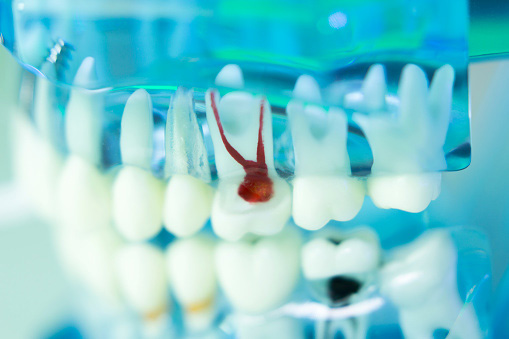Endodontics
Manchester, CT
Endodontics provided by Columbia Implant Center in Manchester, CT
 At Columbia Implant Center, we have endodontists on the team to help with your care. Endodontics is a specialized branch of dentistry focused on the diagnosis, treatment, and prevention of diseases and injuries of the dental pulp or the nerve of the tooth. Often referred to as root canal therapy, endodontics plays a crucial role in preserving natural teeth, alleviating pain, and maintaining oral health. At Columbia Implant Center, we have endodontists on the team to help with your care. Endodontics is a specialized branch of dentistry focused on the diagnosis, treatment, and prevention of diseases and injuries of the dental pulp or the nerve of the tooth. Often referred to as root canal therapy, endodontics plays a crucial role in preserving natural teeth, alleviating pain, and maintaining oral health.
The Importance of Endodontics
The primary goal of endodontics is to save natural teeth that might otherwise need extraction due to infection or damage. The dental pulp, located at the center of the tooth, contains nerves, blood vessels, and connective tissue. When the pulp becomes inflamed or infected, it can cause severe pain and lead to abscesses or systemic health issues if left untreated. Endodontic treatment removes the infected pulp, cleans and disinfects the inner chambers of the tooth, and seals it to prevent further infection.
Common Endodontic Procedures
Root canal therapy removes the infected pulp, cleans and shapes the root canals, and fills them with a biocompatible material. The tooth is then restored with a crown or filling to protect it and restore its function. Root canal therapy can relieve pain, eliminate infection, and save the natural tooth.
Sometimes, a tooth that has undergone root canal therapy may not heal properly or can become reinfected. Endodontic retreatment involves reopening the tooth, removing the previous filling materials, and repeating the cleaning, shaping, and sealing processes.
When inflammation or infection persists in the bony area around the end of the tooth after a root canal procedure, an apicoectomy is often necessary. This surgical procedure involves removing the tip of the root and the surrounding infected tissue. The end of the root canal is then sealed to prevent further infection.
Pulpotomies and pulpectomies are often performed on children with baby teeth. A pulpotomy involves removing the infected part of the pulp, while a pulpectomy entails removing all the pulp tissue. These treatments help save the tooth until it is ready to fall out naturally.
Benefits of Endodontic Treatment
Endodontic treatment alleviates severe tooth pain caused by infection of the dental pulp. This allows patients to resume their daily activities without discomfort.
Endodontic procedures aim to save natural teeth that might otherwise need extraction. Keeping the natural tooth helps maintain proper chewing function, prevents the shifting of adjacent teeth, and preserves the jawbone structure.
Endodontic therapy also prevents the spread of infection to other teeth and surrounding tissues, reducing the risk of more severe health issues.
The Endodontic Procedure: What to Expect
The process begins with a thorough examination, including X-rays, to diagnose the problem and plan the treatment. We will discuss the procedure, its benefits, and any potential risks.
The tooth and surrounding area are then numbed with local anesthesia to ensure a pain-free experience during the procedure. We will create a small access hole in the tooth to reach the pulp chamber and root canals. The infected or damaged pulp is removed, and the canals are cleaned, shaped, and disinfected.
Once the canals are cleaned, they are filled with a biocompatible material called gutta-percha. The access hole is sealed with a temporary or permanent filling. After the root canal is complete, the tooth is restored with a crown or filling to protect it from fracture and restore its function.
In-House Lab and Same-Day Dentistry Services
We are proud to have an in-house lab that allows us to provide efficient and high-quality dental treatments. With our advanced facilities, we can often offer same-day dentistry services for a wide range of dental needs, ensuring that you receive the care you need without unnecessary delays.
Schedule Your Appointment
To learn more about the services we provide at Columbia Implant Center, call (860) 743-1898 and schedule your appointment now!
|